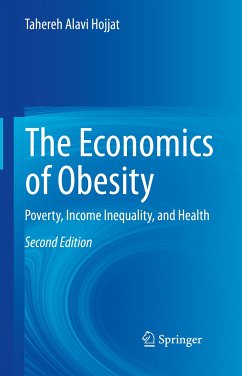
The Oxford Handbook of the Social Science of Obesity (eBook, PDF)

PAYBACK Punkte
15 °P sammeln!
There is an urgent need to better understand the causes and consequences of obesity, and to learn what works to prevent or reduce obesity. This volume accurately and conveniently summarizes the findings and insights of obesity-related research from the full range of social sciences including anthropology, economics, government, psychology, and sociology. It is an excellent resource for researchers in these areas, both bringing them up to date on the relevant research in their own discipline and allowing them to quickly and easily understand the cutting-edge research being produced in other dis...
There is an urgent need to better understand the causes and consequences of obesity, and to learn what works to prevent or reduce obesity. This volume accurately and conveniently summarizes the findings and insights of obesity-related research from the full range of social sciences including anthropology, economics, government, psychology, and sociology. It is an excellent resource for researchers in these areas, both bringing them up to date on the relevant research in their own discipline and allowing them to quickly and easily understand the cutting-edge research being produced in other disciplines. The Oxford Handbook of the Social Science of Obesity is a critical reference for obesity researchers and is also valuable for public health officials, policymakers, nutritionists, and medical practitioners. The first section of the book explains how each social science discipline models human behavior (in particular, diet and physical activity), and summarizes the major research literatures on obesity in that discipline. The second section provides important practical information for researchers, including a guide to publicly available social science data on obesity and an overview of the challenges to causal inference in obesity research. The third part of the book synthesizes social science research on specific causes and correlates of obesity, such as food advertising, food prices, and peers. The fourth section summarizes social science research on the consequences of obesity, such as lower wages, job absenteeism, and discrimination. The fifth and final section reviews the social science literature on obesity treatment and prevention, such as food taxes, school-based interventions, and medical treatments such as anti-obesity drugs and bariatric surgery.
Dieser Download kann aus rechtlichen Gründen nur mit Rechnungsadresse in A, B, BG, CY, CZ, D, DK, EW, E, FIN, F, GR, HR, H, IRL, I, LT, L, LR, M, NL, PL, P, R, S, SLO, SK ausgeliefert werden.













